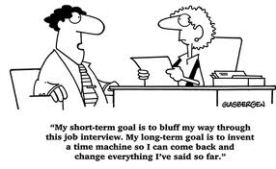Sometimes candidates give answers like the ones above. Seriously, I’ve heard some AMAZING answers to the question of where they see themselves in five years. I’ve also seen some supervisors eat it up and insist upon hiring the individual who gave that answer.
So how do you prep your supervisors for an interview and ensure they’re going to be productive and give a valid opinion?
You need to give them some sort of direction. If you can give them a list of questions you want answered or information you need gleaned and you trust them, you can let them interview the individual by themselves. I personally don’t like this approach… inevitably the supervisor will ask if children will interfere with their schedule or if they have a chronic illness that will make our insurance premiums increase. Train them on what they can and can’t say, then make sure they follow the rules.
The approach I like is to have a meeting with the supervisor prior to interviewing to go over what we would like to accomplish, the individual’s background, any specific questions we have, and then go from there. They feel comfortable speaking up, but you’re there to really guide the interview. This way you can debrief and discuss the candidates together, you get their opinions and viewpoint on answers you heard as well.
There are pros and cons to each situation and what works for me may not work for you. The bottom line is that you need to ensure the supervisor is actually prepared to interview before they meet the candidate. I’ve had a fairly good interview with a candidate, then sent them to the supervisor who was told this candidate, “kept all those bitches in line” at his last job. It is our responsibility as HR Pros to prepare the supervisors for interviewing.
If they are just going to ask something dumb, or worse illegal, why even bother?
Because supervisors don’t like to be handed a new hire and told they have to train them and lead them. If this individual turns out to be horrible, the blame lies squarely on HR and you get a reputation for not knowing what the business needs. It doesn’t matter if you hired 10 amazing people before this one, the ONE new hire that didn’t work out will be on your head. Giving supervisors some of the responsibility fosters a partnership in the new hire and makes the supervisor invested in their success. They also see the other candidates and realize that this individual really is the most qualified and best fit out of the pool. This isn’t to say you always have to hire the one the supervisor likes, but letting them have input in the decision fosters better hires, more collaboration, and a better experience for the new hire. Nobody wants to be told on their first day that they were “forced” upon their supervisor who is now “stuck” training them.






